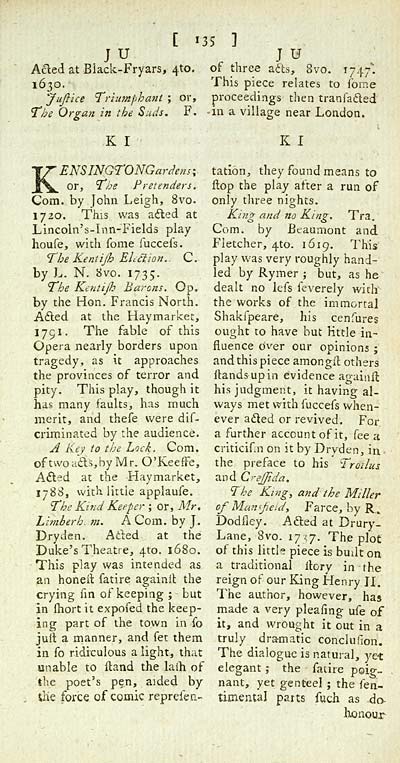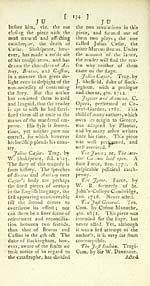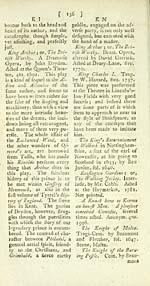Glen Collection of printed music > Printed text > New theatrical dictionary
(149) Page 135
Download files
Complete book:
Individual page:
Thumbnail gallery: Grid view | List view

I <
35 1
J u
J
U
Acted at Black-Fryars,
4to.
of three act
s, 3vo. 1747I
1630.
This piece relates to fonie
J uj} ice
Triumphant
; or,
proceedings
then tranfacted
The Organ in the Suds.
F.
-in a village
near London.
K I
K I
KENSINGTONGardens;
or, The Pretenders.
Com. by John Leigh, 8vo.
1720. This was acted at
Lincoln's-Inn-Fields play
houfe, with Tome fuccefs.
The Keniijh Ekftion. C .
by L. N. 8vo. 1735.
The Kentifto Barons. Op.
by the Hon. Francis North.
Acted at the Haymarket,
1 791. The fable of this
Opera nearly borders upon
tragedy, as it approaches
the provinces of terror and
pity. This play, though it
has many faults, has much
merit, and thefe were dis-
criminated by the audience.
A Key to the Lock. Com.
oftwoa&s,by Mr. 6'Keeffe,
Acted at the Haymarket,
1788, with little applaufe.
The Kind Keeper ; or, Mr.
Limber h. m. A Com. by J.
Dryden. Acted, at the
Duke's Theatre, 4to. 1680.
- This play was intended as
an honeii fatire againil the
crying fin of keeping ; - but
in fhortit expoSed the keep-
ing part of the town in To
juft a manner, and fet them
in fo ridiculous a light, that
unable to ftand the laih of
the poet's pen, aided by
the force of comic represen-
tation, they found means to
flop the play after a run of
only three nights.
King and no King. Tra.
Com. by Beaumont and
Fletcher, 4to. 16 19. This
play was very roughly hand-
led by Rymer ; but, as he
dealt no lefs feverely with
the works of the immortal
Shakfpeare, his cenfures
ought to have but Kttle in-
fluence over our opinions ;
and this piece amongit others
ftandsupin evidence againfl
his judgment, it having al-
ways met with fuccefs when-
ever acted or revived. For
a further account of it, fee a
criticiSm on it by Dryden, in
the preface to his' Trot/us
and CreJJida.
The King, and the Miller
ofMantJieldy Farce, by R.„
Dodfiey. Acted at Drury-
Lane, 8vo. 1737. The plot
of this little piece is built on
a traditional itory in the
reign of our King Henry II.
The author, however, has
made a very pleafing ufe of
it, and wrought it out in a
truly dramatic conclufion.
The dialogue is natural, yet
elegant j the fatire poig-
nant, yet genteel ; the Sen-
timental parts Such as do-
honour
35 1
J u
J
U
Acted at Black-Fryars,
4to.
of three act
s, 3vo. 1747I
1630.
This piece relates to fonie
J uj} ice
Triumphant
; or,
proceedings
then tranfacted
The Organ in the Suds.
F.
-in a village
near London.
K I
K I
KENSINGTONGardens;
or, The Pretenders.
Com. by John Leigh, 8vo.
1720. This was acted at
Lincoln's-Inn-Fields play
houfe, with Tome fuccefs.
The Keniijh Ekftion. C .
by L. N. 8vo. 1735.
The Kentifto Barons. Op.
by the Hon. Francis North.
Acted at the Haymarket,
1 791. The fable of this
Opera nearly borders upon
tragedy, as it approaches
the provinces of terror and
pity. This play, though it
has many faults, has much
merit, and thefe were dis-
criminated by the audience.
A Key to the Lock. Com.
oftwoa&s,by Mr. 6'Keeffe,
Acted at the Haymarket,
1788, with little applaufe.
The Kind Keeper ; or, Mr.
Limber h. m. A Com. by J.
Dryden. Acted, at the
Duke's Theatre, 4to. 1680.
- This play was intended as
an honeii fatire againil the
crying fin of keeping ; - but
in fhortit expoSed the keep-
ing part of the town in To
juft a manner, and fet them
in fo ridiculous a light, that
unable to ftand the laih of
the poet's pen, aided by
the force of comic represen-
tation, they found means to
flop the play after a run of
only three nights.
King and no King. Tra.
Com. by Beaumont and
Fletcher, 4to. 16 19. This
play was very roughly hand-
led by Rymer ; but, as he
dealt no lefs feverely with
the works of the immortal
Shakfpeare, his cenfures
ought to have but Kttle in-
fluence over our opinions ;
and this piece amongit others
ftandsupin evidence againfl
his judgment, it having al-
ways met with fuccefs when-
ever acted or revived. For
a further account of it, fee a
criticiSm on it by Dryden, in
the preface to his' Trot/us
and CreJJida.
The King, and the Miller
ofMantJieldy Farce, by R.„
Dodfiey. Acted at Drury-
Lane, 8vo. 1737. The plot
of this little piece is built on
a traditional itory in the
reign of our King Henry II.
The author, however, has
made a very pleafing ufe of
it, and wrought it out in a
truly dramatic conclufion.
The dialogue is natural, yet
elegant j the fatire poig-
nant, yet genteel ; the Sen-
timental parts Such as do-
honour
Set display mode to: Large image | Transcription
Images and transcriptions on this page, including medium image downloads, may be used under the Creative Commons Attribution 4.0 International Licence unless otherwise stated. ![]()
| Special collections of printed music > Glen Collection of printed music > Printed text > New theatrical dictionary > (149) Page 135 |
|---|
| Permanent URL | https://digital.nls.uk/90317153 |
|---|
| Description | Scottish songs and music of the 18th and early 19th centuries, including music for the Highland bagpipe. These are selected items from the collection of John Glen (1833 to 1904). Also includes a few manuscripts, some treatises, and other books on the subject. |
|---|
| Description | The Glen Collection and the Inglis Collection represent mainly 18th and 19th century Scottish music, including Scottish songs. The collections of Berlioz and Verdi collected by bibliographer Cecil Hopkinson contain contemporary and later editions of the works of the two composers Berlioz and Verdi. |
|---|

